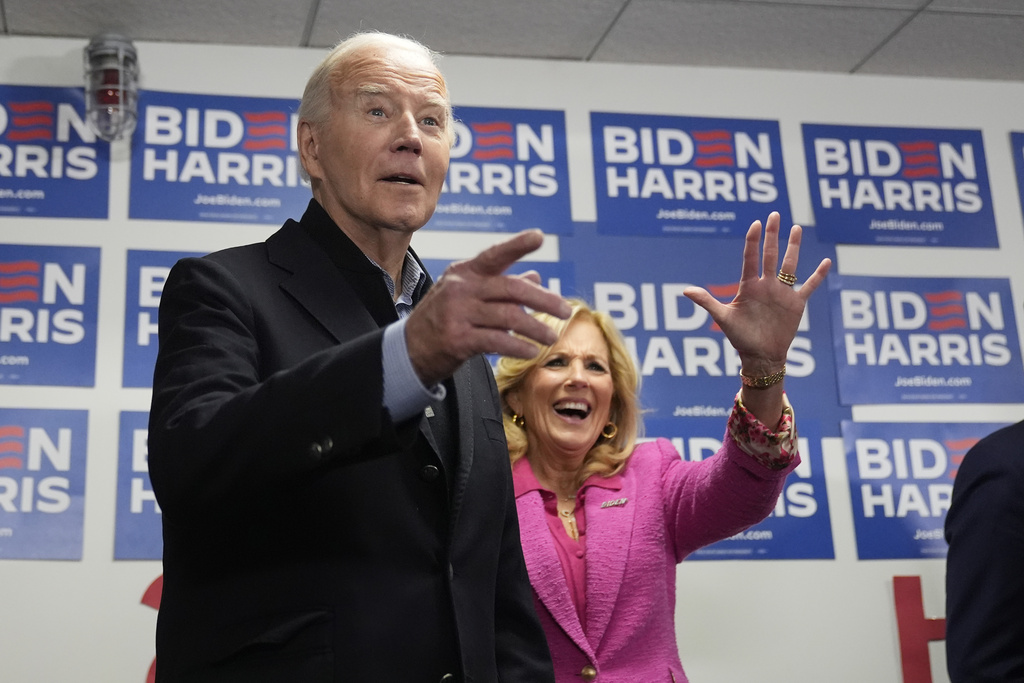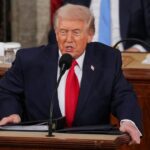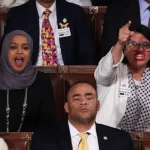
COLUMBIA, South Carolina — President Joe Biden notched a landslide victory in South Carolina’s Democratic presidential primary Saturday night, the first step to securing his party’s 2024 nomination ahead of a likely November rematch with former President Donald Trump.
The polls closed at 7 p.m. in the first 2024 primary sanctioned by the Democratic National Committee. The Associated Press called the victory for Biden 23 minutes later in a sign of his dominance over challengers, author Marianne Williamson and Rep. Dean Phillips (D-MN). With about 95% of the results tallied, Biden held a commanding lead with 96% of the vote, compared to 2% for Williamson and 1.7% for Phillips.
Though Biden, 81, announced his reelection bid last spring, media pundits and top Democratic lawmakers and officials openly speculated about replacing Biden atop the party’s presidential ticket, citing concerns about his age and general performance in the White House.
Prominent national Democrats, including Gov. Gavin Newsom (D-CA), Gov. J.B. Pritzker (D-IL), and even former First Lady Michelle Obama, had been speculated to be Biden replacements, yet the president’s strong performance in the Palmetto State helped to put that narrative to rest.
“Tonight, just three days into Black History Month, black voters have made our voices heard, and we went out, and we’re going to launch our President Biden back to the White House,” South Carolina Democratic Party chair Christale Spain told attendees at the party’s primary night watch party. “I’ve said it before: The South has something to say.”
“Democrats made the win that happened tonight, and we did it through months of hard work and dedication,” Democratic National Committee chairman Jaime Harrison added. “We and staff and volunteers working tirelessly. All eyes were on South Carolina, and you all got us and delivered.”
Rep. Jim Clyburn (D-SC), a co-chairman of Biden’s 2024 campaign, additionally told supporters he had just gotten off the phone with Biden and had promised to call him back shortly, which “means [he] won’t be talking to you for long.”
Shortly after his remarks, Clyburn returned to the stage with the president on speaker phone. Biden thanked voters for their support, though technical difficulties made it impossible to make out his exact words.
Biden saw particularly strong early voting support from black voters, something the campaign had hoped to secure to push back on the idea that Biden’s support from minority voters had slipped across his more than three years in office. Black voters turned out in especially high numbers during South Carolina’s early voting period, accounting for 76.5% of all votes cast during the two weeks leading up to Saturday’s election.
Overall turnout, however, appeared to be low, with many polling locations in urban areas reporting just dozens of voters by early afternoon.
That could be attributed to South Carolina’s open primary structure. Registered Democrats, Republicans, and independent voters may choose to vote in either state primary. And Primary Pivot, a super PAC opposing Trump’s White House bid, sent more than 200,000 texts to South Carolina voters who participated in the 2020 Democratic primary, urging them not to vote Saturday and instead back former South Carolina Gov. Nikki Haley in the GOP primary on Feb. 24.
Still, South Carolina almost certainly will vote Republican in November, and Biden opted not to travel to Columbia for the state party’s primary night celebration. While he spent the week in Michigan, Florida, Washington, D.C., and Delaware before heading to Los Angeles on Saturday, Biden took some time to call into four South Carolina radio stations this week, saying he kept his promises to black voters and pledging that he would not take their support for granted.

“You’re the first Democratic primary that counts,” Biden said on WFMV 96.1FM with Jamal Bates. “And, you know, it’s really important that South Carolina be first in the nation because it reflects the nation more. It’s more diverse. It has more, not only African Americans, but more people of different backgrounds. And I think it’s more reflective of what … needs to be done.”
Biden campaigned in the state twice over the past month, including a day trip to Charleston on Jan. 8 and a two-day stint in Columbia last weekend.
Vice President Kamala Harris served as the campaign’s closer during a rally at South Carolina State University, a historically black college an hour south of Columbia, on Friday.
Harris was joined by Harrison and Clyburn, an alumnus of the school, and her remarks culminated in a full-throated denouncement of Trump.
“The former president openly talks about his admiration for dictators and has vowed that he will be a dictator on Day One,” the vice president said. “As the great Maya Angelou said, ‘When someone tells you who they are, believe them the first time.’ Well, the former president has told us who he is, and it is on us then to recognize the profound threat he poses to our democracy and our freedoms.”
This year marked the first time the state Democratic Party held a “contested” primary for an incumbent president. The state party allocated delegates through a caucus system until 1992 and did not hold public primaries ahead of former Presidents Bill Clinton and Barack Obama’s reelection bids in 1996 and 2012, respectively. The state party also did not hold a primary in 2000 during former Vice President Al Gore’s presidential campaign.
And, since 1992, South Carolina has served as a totally accurate barometer for predicting Democratic presidential nominees, at least when primaries are held.
CLICK HERE TO READ MORE FROM THE WASHINGTON EXAMINER
Biden opted to move South Carolina ahead of Iowa and New Hampshire to first-in-the-nation status as a thank-you for helping revitalize his 2020 campaign, and election and campaign scholars have argued since 2016 that the party’s first nominating states should look more like the demographic makeup of the national party, citing South Carolina specifically.
“We were picked to go first because our voters give a damn, and our voters have turned out repeatedly, and we pick presidents,” South Carolina Democratic Party executive director Jay Parmley explained. “And we have demonstrated through all of this activity, and through our strong early vote numbers, that we were damn well deserving of this and that our voters are enthusiastic and energized.”




